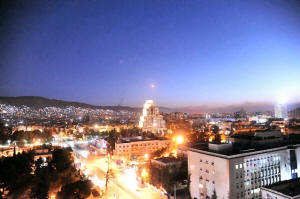|
US, UK, France strike Syria in first
coordinated action against Assad
 Send a link to a friend
Send a link to a friend
 [April 14, 2018]
By Steve Holland and Tom Perry [April 14, 2018]
By Steve Holland and Tom Perry
WASHINGTON/BEIRUT (Reuters) - U.S., British
and French forces struck Syria with more than 100 missiles on Saturday
in the first coordinated Western strikes against the Damascus
government, targetting what they called chemical weapons sites in
retaliation for a poison gas attack.
U.S. President Donald Trump announced the military action from the White
House, saying the three allies had "marshaled their righteous power
against barbarism and brutality".
As he spoke, explosions rocked Damascus.
The bombing represents a major escalation in the West's confrontation
with Assad's superpower ally Russia, but is unlikely to alter the course
of a multi-sided war which has killed at least half a million people in
the past seven years.
That in turn raises the question of where Western countries go from
here, after a volley of strikes denounced by Damascus and Moscow as at
once both reckless and pointless.
By morning, the Western countries said their bombing was over for now.
Syria released video of the wreckage of a bombed-out research lab, but
also of President Bashar al-Assad arriving at work as usual, with the
caption "morning of resilience".
There were no immediate reports of casualties, with Damascus allies
saying the buildings hit had been evacuated in advance.

British Prime Minister Theresa May described the strike as "limited and
targeted". She said she had authorized British action after intelligence
indicated Assad's government was to blame for gassing the Damascus
suburb of Douma a week ago.
In a speech she gave a vivid description of the victims of the chemical
strike that killed scores, huddling in basements as gas rained down. She
said Russia had thwarted diplomatic efforts to halt Assad's use of
poison gas, leaving no option but force.
French President Emmanuel Macron said the strikes had been limited so
far to Syria's chemical weapons facilities. Paris released a dossier
which it said showed Damascus was to blame for the poison gas attack on
Douma, the last town holding out in a rebel-held swathe of territory
near Damascus which government forces have recaptured in this year's
biggest offensive.
Washington described its targets as a center near Damascus for the
research, development, production and testing of chemical and biological
weapons, a chemical weapons storage site near the city of Homs and
another site near Homs that stored chemical weapons equipment and housed
a command post.
U.S. Defense Secretary Jim Mattis called the strikes a "one time shot",
although Trump raised the prospect of further strikes if Assad's
government again used chemical weapons.
"We are prepared to sustain this response until the Syrian regime stops
its use of prohibited chemical agents," the U.S. president said in a
televised address.
The Syrian conflict pits a complex myriad of parties against each other,
with Russia and Iran giving Assad military help that has largely proven
decisive over the past three years, crushing any rebel threat to topple
him. Fractured opposition forces have had varying support from the West,
Arab states and Turkey.
The United States, Britain and France have all bombed Islamic State
fighters in Syria for years and had troops on the ground to fight them,
but refrained from targetting Assad's government apart from a volley of
U.S. missiles last year.
Although the Western countries have all said for seven years that Assad
must leave power, they held back in the past from striking his
government, lacking a wider strategy to defeat him.
Assad's government and allies responded outwardly with fury to
Saturday's attack, but also made clear that they considered it a
one-off, unlikely to harm Assad in any meaningful way.
Russia, whose relations with the West have deteriorated to levels of
Cold War-era hostility, has denied that last week's chemical weapons
attack took place and even accused Britain of staging it to whip up
anti-Russian hysteria.

President Vladimir Putin called for a meeting of the U.N. Security
Council to discuss what Moscow decried as an unjustified attack on a
sovereign state. Syrian state media called the attack a "flagrant
violation of international law." An official in Iran's Revolutionary
Guards said it would cause consequences against U.S. interests.
Arab states, generally hostile to Assad and Iran, backed the Western
action, including both Saudi Arabi and its rival Qatar.
"ABSORBED THE STRIKE"
But the Western powers were at pains to avert any further escalation,
including any unexpected conflict with their superpower rival. French
Defense Minister Florence Parly said the Russians "were warned
beforehand" to avert conflict.
A senior official in a regional alliance that backs Damascus told
Reuters the Syrian government and its allies had "absorbed" the attack.
The sites that were targeted had been evacuated days ago thanks to a
warning from Russia, the official said.
"If it is finished, and there is no second round, it will be considered
limited," the official said.
At least six loud explosions were heard in Damascus and smoke rose over
the city, a Reuters witness said. A second witness said the Barzah
district of Damascus was hit.
A scientific research facility in Barzah appeared to have been
completely destroyed, according to footage broadcast by Syrian state TV
station al-Ikhbariya. Smoke rose from piles of rubble and a heavily
damaged bus was parked outside.
[to top of second column]
|

A missile is seen crossing over Damascus, Syria April 14, 2018.
SANA/Handout via REUTERS

The Western intervention appears to have virtually no chance of
altering the military balance of power at a time when Assad is in
his strongest position since the war's early months.
In Douma, site of last week's suspected gas attack, the final buses
were due on Saturday to transport out rebels and their families who
agreed to surrender the town, Syrian state TV reported. That
effectively ends all resistance in the suburbs of Damascus known as
eastern Ghouta, marking one of the biggest victories for Assad's
government of the entire war.
The combined U.S., British and French assault involved more
missiles, but appears to have struck more limited targets, than a
similar strike Trump ordered a year ago in retaliation for an
earlier suspected chemical weapons attack. Last year's U.S. strike,
which Washington said at the time would cripple Assad's air forces
and defenses, had effectively no impact on the war.
Mattis said the United States conducted Saturday's strikes with
conclusive evidence that chlorine gas had been used in the April 7
attack in Syria. Evidence that the nerve agent sarin also was used
was inconclusive, he said.
Syria agreed in 2013 to give up its chemical weapons after a nerve
gas attack killed hundreds of people in Douma. Damascus is still
permitted to have chlorine for civilian use, although its use as a
weapon is banned. Allegations of Assad's chlorine use have been
frequent during the war, although unlike nerve agents chlorine did
not produce mass casualties as seen last week.
The global chemical weapons watchdog, the OPCW, has sent a team to
assess last week's suspected gas attack. Saturday's strikes took
place before the inspectors had a chance to gather evidence at the
scene.

Mattis, who U.S. officials said had earlier warned in internal
debates that too large an attack would risk confrontation with
Russia, described the strikes as a one-off to dissuade Assad from
"doing this again".
But a U.S. official familiar with the military planning said there
could be more air strikes if the intelligence indicates Assad has
not stopped making, importing, storing or using chemical weapons,
including chlorine. The official said this could require a more
sustained U.S. air and naval presence.
EXIT SYRIA?
The U.S., British and French leaders all face domestic political
issues over the decision to use force in Syria.
Trump has been leery of U.S. military involvement in the Middle
East, and is eager to withdraw roughly 2,000 troops in Syria taking
part in the campaign against Islamic State.
"America does not seek an indefinite presence in Syria, under no
circumstances," Trump said in his address. "The purpose of our
actions tonight is to establish a strong deterrent against the
production, spread and use of chemical weapons."
Trump has tried to build good relations with Russian President
Vladimir Putin. A prosecutor is investigating whether Trump's
campaign colluded with Moscow in illegal efforts to help him get
elected, which Trump calls a witch hunt.
"To Iran and to Russia, I ask, what kind of a nation wants to be
associated with the mass murder of innocent men, women and
children?" Trump said in his address.
In Britain, May's decision to order strikes without consulting
parliament overturned an arrangement in place since the 2003
invasion of Iraq. Her predecessor David Cameron was damaged
politically when he lost a vote in the House of Commons on whether
to bomb Syria.
Britain has led international condemnation of Russia, persuading
more than 20 countries to expel Russian diplomats, over the
poisoning with a nerve agent of a former Russian spy in England last
month. May made clear that case was part of her calculus in ordering
retaliation for chemical weapons in Syria.
She argued on Saturday it was necessary to act quickly without
waiting for parliament's approval. Opposition leader Jeremy Corbyn
accused her of following Trump, hugely unpopular in Britain, into
battle without waiting for the evidence.
In France, Macron has long threatened to use force against Assad if
he uses chemical weapons, and had faced criticism over what
opponents described as an empty threat.

(Reporting by Steve Holland and Tom Perry,; Additional reporting by
Phil Stewart, Tim Ahmann, Eric Beech, Lesley Wroughton, Lucia
Mutikani, Idrees Ali, Patricia Zengerle, Matt Spetalnick and John
Walcott in Washington; Samia Nakhoul, Tom Perry, Laila Bassam Ellen
Francis in Beirut; Michael Holden and Guy Faulconbridge in London;
and Jean-Baptiste Vey, Geert de Clerq and Matthias Blamont in Paris;
Polina Ivanova in Moscow, Writing by Peter Graff, Editing by Angus
MacSwan)
[© 2018 Thomson Reuters. All rights
reserved.]
Copyright 2018 Reuters. All rights reserved. This material may not be published,
broadcast, rewritten or redistributed.
Thompson Reuters is solely responsible for this content. |